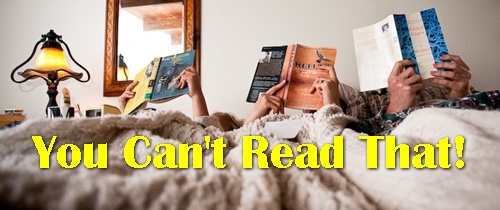You Can’t Read That! is a periodic roundup of news about banned and challenged books.

Arizona:
Last month I wrote about various groups planning to make banned Mexican American studies books available to Tucson area students. Since then I’ve been receiving daily updates on one such group, the Librotraficante Caravan … so many updates that I’m beginning to suspect their primary purpose is self-publicity. I hope I’m wrong about that.
Meanwhile, two previously-reported Arizona school book-banning bills, SB 1467 (which would ban books containing profanity) and SB 1202 (which would ban “partisan” books), are still being debated and have not yet made their way to the governor’s desk.
Elsewhere:
“Fortunately, books I find disgusting simply don’t get purchased by libraries or required by schools, saving me, and other like-minded individuals, from the embarrassing and hypocritical task of challenging them.”
A thoughtful essay about anti-censorship progressives and the books they don’t want their children exposed to.
“How can I raise my child in a Christian home when he is required to read about this?”
That’s what a parent said about John Green’s young adult novel Looking for Alaska. The local paper describes it as a book about “kids gone wild with porn, sex, drugs, alcohol, and death at a boarding school.” Sadly, the school board took the book off the required reading list for AP English. I’m willing to bet the offended parent took a sentence out of context and that the school board didn’t bother to read the book. Looking for Alaska is on my to-read list, and I’ll review it here soon.
Huffington Post headline: One Million Moms Threatens Toys ‘R’ Us With Boycott Over Archie Comics’ Gay Wedding Issue. Yes, I just bet they did.
Waterland, a novel I mentioned in a previous post, has been judged fit for high school students and will remain on a Michigan school district’s AP English reading list.
A high school district in Troy, Pennsylvania tables putting The Kite Runner on the reading list until board members have a chance to read it … or so they say. Based on other challenges and bannings I’ve written about, I have a hard time imagining school board members ever reading anything they’ve banned.
A Greenville, South Carolina middle school is reviewing a Sparknotes guide to Shakespeare’s plays after a parent complained that the guide, which translates Shakespeare’s language into modern English, shockingly included translations of “anatomical terms.” Sadly, the linked article is hidden behind a paywall, but if you’re interested in what the parent is objecting to, here’s a link to a Sparknotes translation of Romeo and Juliet, Act 2, Scene 4.
A public library in Victoria, Canada, bans a childrens’ picture book that contains the words “red Indians.” Hey, haven’t these Canadians heard of the USA’s Huckleberry Finn solution? You know what surprises me? That the book in question, Mog and the Granny, was not written in 1914, but in 1995!
Retail censorship: PayPal threatens to cut off payments to online publishers who market books featuring incest, rape or bestiality. So, would that include the Bible? Update: PayPal backs down … so long as the books in question do not contain pornographic images.
“Now some individuals have decided that Kirby is profiting from the death of one of the people killed by the orca Tilikum … and therefore his book should be banned.”
Well, here’s an interesting new way to ban a book you don’t like: if the book deals with the death of an actual person, claim you’re only trying to respect that person’s memory.
When it comes to prison book censorship, you just never know what will trigger a ban. Like, for example, a Pennsylvania prison decision to ban a “Route 6 tourist brochure with a map … because it allegedly advocated ‘violence, insurrection or guerrilla warfare against the government.’”
Like they say, you can’t make this shit up!